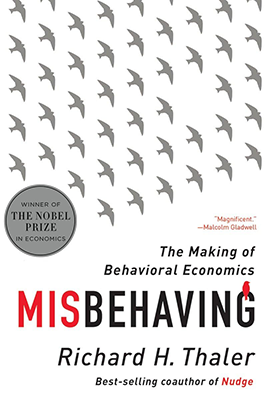Misbehaving: The Making of Behavioral Economics
“Misbehaving: The Making of Behavioral Economics” by Richard H. Thaler is a book that explores the evolution of behavioral economics and the insights it offers into human decision-making. Here’s a summary of its key points:
- Traditional Economics vs. Behavioral Economics: Thaler discusses the limitations of traditional economic theory, which assumes that individuals are rational, self-interested agents who make decisions to maximize their utility. He introduces the field of behavioral economics, which incorporates insights from psychology and other social sciences to understand how people actually behave in economic situations.
- Biases and Heuristics: The book explores the various cognitive biases and heuristics that influence human decision-making. Thaler discusses phenomena such as loss aversion, mental accounting, anchoring, and overconfidence, which can lead to deviations from rational economic behavior.
- The Power of Nudges: Thaler introduces the concept of “nudges,” which are interventions designed to influence behavior in a predictable way without restricting choice. He discusses how nudges can be used to encourage people to make better decisions, such as saving for retirement, eating healthier, or conserving energy.
- Applications in Policy and Business: Thaler explores the practical applications of behavioral economics in policy-making, business, and everyday life. He discusses how insights from behavioral economics have been used to design more effective public policies, improve consumer welfare, and enhance organizational decision-making.
- The Rise of Behavioral Economics: Thaler provides a historical overview of the development of behavioral economics as a field of study. He discusses key figures and milestones in the field, as well as the challenges and controversies it has faced along the way.
- Experiments and Evidence: Thaler discusses the importance of empirical research and experimental evidence in behavioral economics. He highlights various experiments and studies that have shed light on human decision-making, providing valuable insights into the biases and heuristics that shape our behavior.
- Ethical Considerations: The book explores the ethical implications of using behavioral insights to influence behavior. Thaler discusses the importance of transparency, consent, and accountability in the design and implementation of interventions informed by behavioral economics.
- Future Directions: Thaler concludes by discussing the future of behavioral economics and the opportunities for further research and application. He emphasizes the importance of interdisciplinary collaboration and ongoing dialogue between economists, psychologists, policymakers, and practitioners.
Overall, “Misbehaving” offers a fascinating and accessible introduction to the field of behavioral economics, providing valuable insights into the complexities of human decision-making and the implications for policy, business, and society.

